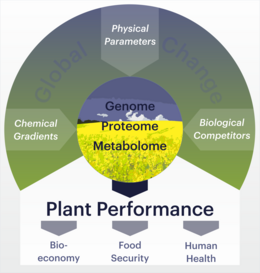Mission Statement
Research at the Leibniz Institute of Plant Biochemistry (IPB) focuses on the chemical diversity, the biosynthesis, the biological roles, and the mechanisms of action of plant and fungal natural products, with an emphasis on specialized metabolites and signaling molecules. Our aim is to develop a comprehensive molecular understanding of the adaptive and developmental processes which plants evolved as a consequence of their dynamic interaction with the environment. The resulting changes in gene expression and phenotype are analyzed in interdisciplinary approaches at the genome, proteome, and foremost at the metabolome level. The knowledge gained paves the way to a plant-based bioeconomy: it facilitates sustainable crop production, innovative biotechnology and drug development to improve the nutrition and health of humans, animals and plants.
Research Profile
As a consequence of their sessile lifestyle, plants evolved to become masters of resilience which implement unique adaptive strategies for survival and success. The rich biodiversity within the plant kingdom is echoed by the enormous chemical diversity of plant natural products. The species-specific complement of natural compounds changes dynamically in its complexity during the life cycle of plants and their perpetual interactions with the unpredictable environment. Plants respond to local challenges or opportunities with directional organ growth for stress evasion or habitat exploration. More importantly, plants adjust their central and peripheral metabolism to synthesize an arsenal of bioactive chemicals for self-defense against pathogens and herbivores, for efficient communication with other organisms, or for facilitating access to external resources. Plant responses to environmental challenges are governed by multiple and highly complex information processing networks and are realized at the cellular and organismic level. Therefore, knowledge of the structure, synthesis, function, and modes of action of biologically active metabolites and intermediates, as well as of regulatory proteins and nucleic acids, will be essential for a comprehensive understanding of the biodiversity of plants and their sophisticated adaptive processes. The knowledge gained will enable novel approaches to sustainable production of value-added crops, innovative biotechnology and drug development, and will thus advance a plant-based bioeconomy.
Focus Areas
The Leibniz Institute of Plant Biochemistry (IPB) vigorously pursues its research mission, which proves of outmost societal importance in the face of global change, by merging and focusing its unique assembly of chemical and biological research competencies. The IPB addresses in interdisciplinary approaches and close thematic collaborations relevant questions and important problems in natural product chemistry, metabolism and protein biochemistry, cell and plant biology, as well as in synthetic biology and biotechnology. IPB activities are supported by jointly established technology platforms, databases, and a key set of research expertise.
Strategic themes of interdisciplinary research and cooperation at the IPB are the following topics:
Natural Products
Natural Products New insights into of fungal and plant-based drugs and their application (isolation, analytics, metabolomics, synthesis, chemoinformatics, chemical properties, biological effects, target identification and proteom-based methods).
Chemical Mediators
Understanding the regulation of environmental adaptation processes at the molecular, metabolic, cellular and organismic level for the reprogramming of plant metabolism and plant development. Focus on relevant biotic and abiotic parameters, plant hormones and chemical mediators, regulatory proteins and nucleic acids, as well as associated signal processing modules.
Interactions
Decoding of molecular recognition, signal processing and defense reactions in organismic interactions between plants, pathogens, symbionts and endophytes. Focus on chemical communication with the microbiome in the rhizosphere and phyllosphere.
Biotechnology
Biosynthesis, regulation and design of metabolic pathways. Biocatalysis, metabolic engineering and synthetic biology open up new avenues for the production of valuable natural products and their derivatives on the basis of natural or rationally designed biosynthetic pathways.
This page was last modified on 27 Jan 2025 27 Jan 2025 27 Jan 2025 27 Jan 2025 27 Jan 2025 27 Jan 2025 27 Jan 2025 27 Jan 2025 .



